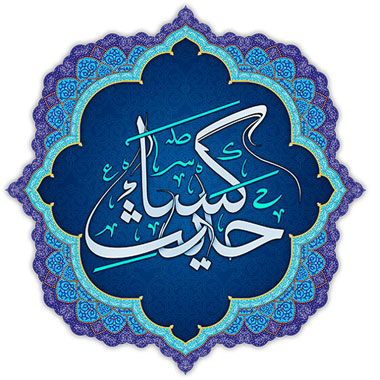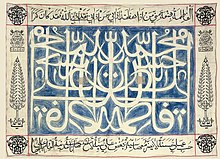
Ahl al-Kisa (Arabic: أَهْل ٱلْكِسَاء, ʾAhl al-Kisāʾ ), or the People of the Cloak, are the Islamic prophet Muhammad; his daughter Fatimah; his cousin and son-in-law Ali; and his two grandsons Hassan and Husayn.[۱]
They are also called Aal al-Aba (Arabic: آل ٱلْعَبَاء ʾĀl al-ʿAbāʾ ) and in Persian Panj-Tan (Persian: پنج تن), meaning ‘the Five’. The origin of this belief is found in the Hadith of the Event of the Cloak and the Hadith of Mubahala. This hadith is graded authentic by Shia Muslims and Sunnis, however many Sunnis plead a different interpretation.
It is one of the foundations of the Shia conception of the Imamah, which states that patrilineal descendants of Muhammad’s daughter have a special divine spiritual leadership over the Muslim community. The Ahl al-Kisa, along with their descendants, the Imams, form the Shia definition of Ahl al-Bayt, the “People of the House,” or the family of Muhammad.
The three larger branches of Shia Islam differ on the nature of the Ahl al-Kisa and the Imams. The two largest branches, the mainstream Twelvers and the Ismailis, consider them to be in a state of ismah, or infallibility: a belief originating from the Verse of Purification in the Quran.
In contrast, the third branch, the Zaidis, view them only as political figures with the duty to lead revolts against corrupt rulers and governments.
Hadith of the Cloak
The Hadith of the Cloak (Arabic: حديث الكساء Hadith-e-Kisa) refers to the Ahl al-Kisa. The hadith is an account of an incident where Muhammad gathered Hassan, Husayn, Ali, and Fatimah under his cloak. This is referred to in several hadiths, including within Sahih Muslim, in which Muhammad is quoted as saying Ahl al-Bayt, or the People of the House, from the second part of the Verse of Purification (ayat ul-tahir).[further explanation needed][]
This hadith is central to the Shia beliefs. For the Shia, it is the basis of the doctrine that the leader of the Muslims should be purified (per Quran 33:33) and from that particular direct line of descendants of Muhammad through Fatimah and Ali that have thus been purified by God. It also serves as the majority Shia doctrine that this line of descendants are infallible, pure, and sinless (ma’suum). The Shia believe that the hadith shows that Muhammad, Fatima, Ali, Hasan, and Husayn are the only members of the Ahl al-Bayt.
Generally, Sunnis also accept the spiritual significance of the event of purification as exalted in the Quran and elaborated upon by Saheeh Hadith (see below), but do not subscribe to the political authority that the Shia infer from this belief.
Context[]
Certain Sunni scholars hold that the wives of Muhammad were included in the second part of the verse 33:33, since they are addressed in the beginning of verse 33:33. They reject the notion that the end of this verse would be a stand-alone blessing, meant exclusively for Muhammad, Ali, Fatima, Hasan, and Husain, as they have in mind the context of the verse as a whole and the one preceding it.[citation needed] Albeit, most Sunni would accept the Sahih hadith and concur with the Shia that the special privilege is conferred on the five.[citation needed]
The Shia counter-argument is that the verse itself says “only,” implying that the blessing of this merit is exclusive to a single group and one other than the wives, i.e. God desires to keep away the uncleanness from “only” you, “O people of the House”, and not from anyone else, and this is why the six stern commandments of the other verses are given to the wives, because they are not protected and must act accordingly; the “people of the house”, on the other hand, need no such instructions. The Shia also point out that the rhetoric changes to a masculine tone in the final part of the verse whereas it was feminine before that.[citation needed]
A hadith attributed to ‘A’isha reports]citation needed
… that God’s Apostle (may peace be upon him) went out one morning wearing a striped cloak of the black camel’s hair that there came Hasan b. ‘Ali. He wrapped him under it, then came Husain and he wrapped him under it along with the other one (Hasan). Then came Fatima and he took her under it, then came ‘Ali and he also took him under it and then said: God desires to take away any uncleanliness from you, O people of the household, and purify you [thorough purifying]” ….
Sunnis tend to view this as Sahih and have included it in Sahih Muslim.]





